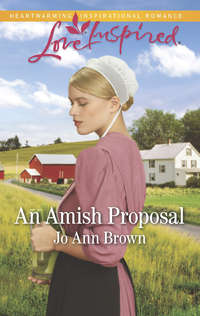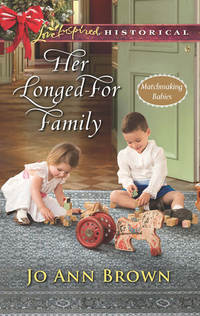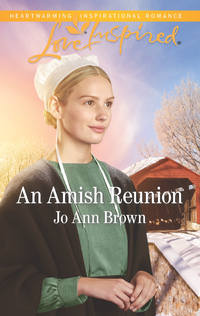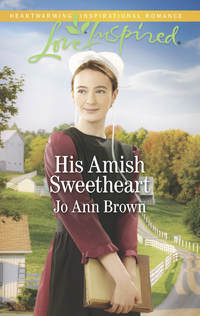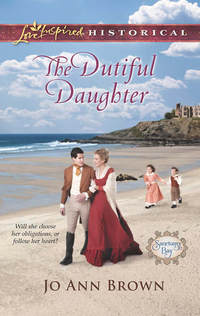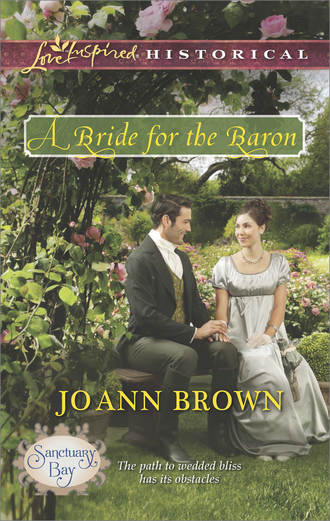
Полная версия
A Bride for the Baron
Miss Fenwick stared at him, her eyes widening as understanding dawned. She whispered, “What did you see?”
“I don’t want to say until I am sure of my suspicions.”
“Smugglers?” Her voice remained hushed.
He nodded grimly. “Take a deep breath. What do you smell?”
She did and shivered. “Some sort of distilled spirits.”
“Brandy, I would guess. A lot of it if the odor lingers after the fire.” He let his breath sift past his clenched teeth. “Brandy burns fast and hot.”
“You think someone used it to start a fire in the church?”
“Possibly. I need to check the cellar to see if there is a clue there.” He put his foot on the closest beam. It cracked and tumbled into the cellar with a crash.
Mr. Fenwick stormed toward them and pushed between Edmund and his sister. “My lord, it may not be my place to tell you what you should do, but we lost your predecessor barely a year ago. To have you risk your neck now would be foolhardy.”
“Aye,” chimed the men who had gathered by the cellar.
Miss Kightly, who had followed the vicar, grasped Edmund’s arm with both hands. “My dear Lord Meriweather, there are others who can go down into the cellar in accordance with your directions.”
“You cannot believe,” Miss Fenwick said with a serenity that contrasted with the panic in the other voices, “that Lord Meriweather would ask someone else to do what he himself would not. He is not that sort of man.”
“But, Vera,” began her brother.
“Have you forgotten that Lord Meriweather fought heroically for our nation?” she fired back.
“Of course not,” Miss Kightly said, “but—”
“Then trust that he would not do something risky without having a good reason.” Miss Fenwick faced him. “But he also must see the good sense of taking one or two others with him in case the debris shifts.”
Edmund was pleased by Miss Fenwick’s defense of his plan. Suddenly the wind seemed less cold and the sunlight brighter because he had an ally. Her eyes glinted like the sapphire sky above them. A man could lose himself in eyes like hers. Maybe he already had, because he had no idea how long he had gazed into her eyes or how long he would have continued if one of the men had not sneezed.
Clearing his throat, he thanked her for her good idea. He asked for volunteers. Every man, except the vicar, raised his hand. In dismay, he wondered which one he should choose.
“If I may make a couple of suggestions, my lord,” Miss Fenwick said.
Grateful and hoping his face was not blazing with embarrassment, he said, “Most certainly.”
“Mr. Sims is slender and able to squeeze into small places.” She smiled when she added, “Mr. Henderson may be the strongest man in Sanctuary Bay. If one of the timbers slips, he will be able to hold it while all of you escape.”
Edmund did not doubt the man was the strongest in the parish. He was built with thick shoulders and looked as if he could lift one of the fishermen’s cobles—their small deep wooden boats—out of the sand and hold it over his head.
“Thank you, Miss Fenwick.” He nodded toward her as if it were the most ordinary matter in the world that the vicar’s sister should make such a decision. “Men, come with me.”
The vicar began praying for their safety as Edmund put his foot on another beam. Edmund added a few prayers of his own as he shifted his weight onto it, and his boot slid slightly. The beam held. With one foot still on the ground, he gave orders for the men to follow one at a time, testing each step they took and never allowing more than one man on a beam at the same time. Without knowing how the joists had been weakened by the fire, they must take extra care.
Edmund eased down into the cellar, feeling more alive than he had in months. The only decision he had to make was where to put his foot next, and he was relieved to see there was no choice. The crisscrossed joists offered a single path. He reached the bottom and frowned at the broken font to his right. For how many centuries had it been part of baptisms? Now it was rubble.
The odor of brandy was very strong, and he saw several crates of empty bottles in a dark pool. He knelt by the pool, dipped his fingers in and tasted the liquid. Water.
He pushed himself to his feet and leaned toward a joist. The odor of brandy was strong on it. Whoever had started the fire had soaked the floor with enough smuggled alcohol that the reek remained. But had it been the smugglers?
The lantern was passed down to him, and he edged toward the place where the opening was cut into the stone wall. The work had been done fairly recently because the chisel marks where the stones had been torn out of the wall still had rough edges.
He peered into the opening. He slapped his hand against the wall when he saw earth and stone blocked what once had been a tunnel. Someone had pulled down the ceiling only a short time before because the stones still had dirt clinging to them.
Taking a step toward the opening, he stopped when his foot struck something soft. He bent down. It was a water-soaked coil of French lace, another favorite item among the smugglers. He had no further doubts. The smugglers had been using the cellar and had burned the church. It was not the first time they had used fire to intimidate, because there had been a suspicious fire in Meriweather Hall’s kitchen before Christmas. But who had given the order to set the church aflame? The order had to have come from their leader, a man who would have no compunctions about burning the parish’s church.
He heard a warning creak. He looked up to see Henderson and Sims dashing up the beams. Dirt and ash fell on him. He did not hesitate. He was close on their heels by the time he reached ground level. Jumping off the beam, he whirled as several joists caved in to the cellar. A gray cloud rose up. He waved aside the ash and coughed.
Edmund motioned for everyone to get back from the edge, then thanked Sims and Henderson and the other men. They nodded and went back to piling debris closer to the cliff. But he did not miss their troubled expressions.
He picked up his coat and pulled it on, listening to make sure the men were not within earshot. As he drew on his greatcoat, he asked, “Mr. Fenwick, when was the last time you were in the church’s cellar?”
“At least eight or nine years ago.” His nose wrinkled. “Shortly after I accepted the living here, I had everything stored down there brought up so it didn’t molder away. The door into the church has been locked shut, and the key was lost years ago.”
“So the smugglers had the perfect place to hide their cargo.”
“Smugglers! In my church?” The vicar shook his head. “Impossible.”
“The evidence is in the cellar.” Edmund outlined what he had seen.
The vicar’s face grew long with dismay. “This is an outrage. When I heard the story that a previous vicar counted himself among the smugglers’ ranks, I had hoped it was untrue. Now...” He choked, unable to continue.
Patting her brother’s arm, Miss Fenwick said, “We must make sure it does not happen again.”
“That may be easier said than done,” Edmund said. “They need a place to hide their illicit cargo. Who knows how long they have been using the church? At least since we made it impossible for them to use the dower cottage at Meriweather Hall. All worked well for them until a section of the church’s roof fell in. They must have feared someone would check the cellar to make sure the joists could support a new roof.”
“So they set the church on fire,” Miss Fenwick said, looking from him to the cellar, “to hide that they had been using the cellar.”
“That is exactly what I was thinking.” He appreciated her acceptance of the facts.
Her brother remained less willing to see what was right in front of them. “But why would they burn this church? We have been discussing building a new church—”
“They could not take a chance that the decision would be made to fix up the old one instead.” Miss Fenwick’s face hardened. “But where will they go next? It could be anywhere.”
Miss Kightly gave a soft cry of fright and wobbled as if she were about to faint. Mr. Fenwick jumped to keep her from falling. He helped her back to her carriage where she could sit and recover her composure.
“I should go back with her,” Miss Fenwick said. “It appears that Gregory and I will be accepting your invitation to stay at Meriweather Hall.”
“For as long as you need to.” Both he and Lady Meriweather would be happy to have company in the huge house that would seem empty now that both his cousins were married to his two best friends, Jonathan Bradby and Charles Winthrop, the earl of Northbridge.
“Thank you. We will need to depend on your hospitality until we can live in the vicarage again. That must wait until after we have a church, of course.” She turned to go, then paused. “Before I go, I must ask you one question.”
“Certainly.”
“You are familiar with constructing buildings. Will you help us rebuild our church?”
She had no idea what she was asking. Overseeing the building of a church would require dozens of decisions each day when he could not make a single one.
“Please, say yes,” she went on. “We need your help.”
What could he say? That he had plans to go to London for the Season? That was not true. That he had to entertain Lady Meriweather? Miss Fenwick would know that was a lie. But he could not speak the truth. He had seen enough pity in his friends’ eyes. He did not want to see more, especially in her eyes. But she was right. He was the man for the task.
God, if this is what You want me to do, I will need Your help more than ever.
“All right,” he said. “I will try to do my best.”
Instantly, he wished he could retract his words. This was the first decision he had made in more than a year, and he feared it would prove to be as bad as the last one.
Chapter Two
Other than the steady plop of thick, cold raindrops outside, not a sound could be heard when Edmund stepped into the entrance hall of Meriweather Hall. He followed the vicar and Miss Fenwick and Miss Kightly. Other than Foggin, the footman who had opened the door, nobody could be seen. Lady Meriweather must have retired to her room, exhausted by the long journey north from Norwich.
The footman, in Meriweather Hall’s black livery, took their coats, then stepped aside as another footman burst into the entrance hall. He skidded to a stop on the stone floor, almost bumping into one of the benches set against the raised panels on the lower half of the walls.
“Jessup,” Edmund said with a frown. He was still learning how a baron should act, but he knew that a footman never behaved that outrageously. “I trust you have an explanation.”
The footman gulped. “I was asked to deliver this message to Miss Kightly the moment she arrived at Meriweather Hall.”
“Perhaps you should not take such requests quite so literally.”
Nodding, the footman said, “I won’t. From this point forward.”
“I am pleased to hear that.” He motioned for Jessup to hand the message to Miss Kightly, and the footman held out a folded sheet to the pretty blonde.
As she opened it, he shifted his gaze toward Miss Fenwick. She stood beside her brother, her hand on his arm in a comforting pose. Not that he was surprised. Miss Fenwick was very supportive of her brother and his ministry. He had known that before, but her request by the remnants of the burned-out church was proof of her devotion to him.
Edmund looked away. Miss Fenwick’s determination to help her brother with his parish must have been what had persuaded her to ask Edmund’s assistance in rebuilding the church. How long would it take for her to realize she had made the request of the wrong man? His gut churned at the idea of having the respect he had seen in her eyes turn to pity.
Pitiful.
He had heard others whisper the word when they thought he could not hear. Even though his closest friends had never spoken so, he knew what was in their heads. It was a pity that Edmund Herriott, who once could be depended on to make a quick decision, now could make none at all. Not good. Not bad.
Pitiful.
A groan sounded in the entry, and, for a moment, he wondered if it had escaped from him.
Miss Fenwick rushed to Miss Kightly’s side, asking her what was wrong, and he shoved away his thoughts that punished him over and over.
Miss Kightly’s smile was forced. “Forgive me. I am simply surprised at the message from my great-uncle.”
“Do you want to share what Sir Nigel has to say?” Miss Fenwick asked.
“Yes, I guess I should. He says that...” Her voice trailed off.
Miss Fenwick looked toward Edmund, and he shrugged. He could think of several possible subjects Sir Nigel might have written about, especially in light of what had happened at the church and what had been discovered.
He was not surprised when Miss Kightly said, “My great-uncle has sent word that I should be ready to return to his house.”
“When?” he asked.
She looked at the note, a lovely golden strand of hair slipping across her pale cheek. “It says only that he will come for me today.” Again a strained smile edged along her lips. “’Tis good then that there has not been enough time to unpack my bags.” She folded the page and looked around.
The footman jumped forward to take it from her at the same time Edmund reached toward her. Jessup backed away with an apology.
Edmund nodded toward him, then said, “If you wish to sit in the small parlor, I will have a hearty tea brought for us.”
“Sit?” Miss Fenwick said with an unexpected laugh. “We have been doing far too much of that.”
He savored the sound of her laugh. It lilted like a lark over a spring field, bringing the warmth of sunshine into the entry hall. When she looked at him, he chuckled, caught up in her amusement.
“I stand corrected,” he replied.
That set off another round of laughter from both ladies, though the vicar remained as somber as his dark clothes. Edmund had to pause to realize what he had said that was funny.
“No,” Miss Fenwick said, “we all stand corrected.”
Were her words a gentle reminder that his guests were exhausted? Maybe so. Maybe not. As with everything else, he could not decide.
But, even if the words were meant only as a jest, he needed to think of his guests’ needs. And his own. His clothes were wet, and they stank of ashes and brandy. He glanced toward the stairs, wondering which rooms were ready for guests. At Christmas, when his other cousin had wed, the Meriweather women had overseen all such preparations.
As if he had spoken aloud, Jessup said, “Lady Meriweather left instructions for where the vicar and his sister and Miss Kightly would stay.”
Thank God for Lady Meriweather’s foresight. He was able to wear a genuine smile as he said, “Jessup will show you to your rooms whenever you wish.”
Miss Fenwick turned to her brother who had not said a word since they had left the church. “Gregory, why don’t you rest? I doubt you have slept an hour since the fire.”
“I can try.” The vicar’s voice was a shadow of its usual booming warmth. “I probably won’t sleep. Every time I close my eyes, I see that inferno rising up from the depths to consume the church. Every time I let my mind wander, it takes me immediately to the moment when I first saw the flames and knew all I have worked for was being destroyed.”
Edmund had to look away before the vicar saw that hated sympathy and pity on his face. He did not want to subject any other person to that expression.
“Try to rest today,” Miss Fenwick said quietly. “You are going to need to be rested for the work yet to be done in rebuilding the parish church.”
“So they can burn it down again?”
Miss Fenwick gasped at the venom in her brother’s voice. “Gregory—”
“Someone should have put a halt to these smugglers by now.” His fury focused on Edmund. “Why haven’t you? Is it because your life’s work isn’t in danger?”
The vicar’s words lashed through Edmund. Through Miss Fenwick, too, if he judged by how her face became a sickly gray. Miss Kightly stared at the vicar as if she had never seen him before. No one spoke as the last echoes of Mr. Fenwick’s words faded from the entry hall.
Again it was Miss Fenwick who spoke first. “You are exhausted, Gregory. You barely know what you are saying.” She put her arm around him, and he wove like a sailor on a ship in a storm. He leaned on her as his head lolled, and she began to buckle.
Edmund leaped forward to pull the vicar’s other arm over his shoulder and help keep both Mr. Fenwick and his sister on their feet. He got the man steady only when the footman Foggin grasped the vicar’s arm that was draped over Miss Fenwick and drew it over his own shoulder. Miss Fenwick stepped back, her blue eyes wide with despair. She grasped Miss Kightly’s hand like a lifeline.
“Jessup and I can get him upstairs to rest, my lord,” Foggin said.
“I want to see that he is settled in,” Miss Fenwick said in a crisp voice that suggested nothing anyone said would change her mind.
“And, if someone could escort me to where my bags were taken,” Miss Kightly said, “I would greatly appreciate it.”
A glance he could not read flashed between the two women, and Miss Fenwick asked, “If you don’t mind, my lord, can Jessup assist Miss Kightly while we see to Gregory?”
It sounded like a reasonable solution, though he knew he could never have come to it on his own. Everyone looked at him, so he nodded. He loathed admitting, even to himself, how grateful he was for Miss Fenwick’s suggestion. He had no idea how long they all would have stood in the entry hall while he tried to determine what to do next.
With a smile and a nod to Jessup, Miss Kightly went up the long staircase, with the footman following like a well-trained puppy. No man of any class could be immune to the blonde’s ethereal beauty. She was like a fairy tale princess come to life.
He shook the thought out of his head. Now was not the time to admire Miss Kightly. The vicar needed his help. Telling Foggin that they would start at the count of three, he took a deep breath. The vicar was completely senseless and, therefore, dead weight.
As they climbed, Edmund wondered if he could have managed to help lug the vicar up the stairs before he had gone to the Continent. The life there had hardened his muscles in ways he had never imagined. In comparison with hefting cannon and gunpowder casks, the vicar was a light load. It had not been an officer’s place to handle such tasks, but, in battle, everyone pitched in to help where they could.
Just as Miss Fenwick asked you to help with the church.
He grimaced at how easily she slipped into his thoughts when he was not on guard to prevent it.
“I can send for another footman, my lord,” Foggin said.
“If you need to be relieved...”
“Nay, my lord.” The footman stumbled over his words as he added, “I meant to take over for you.”
“No need.” That the footman had misread his grimace was probably the best thing that had happened all day. It would not do for the household staff to start whispering about how their lord could not get his mind off Miss Fenwick.
That would be insulting to the vicar’s sister. She had endured enough without him saying something that would be repeated and distorted throughout Sanctuary Bay. It was not she who monopolized his thoughts, but the project she had asked him to work on with her.
The vicar swayed in spite of their grasp on his arms; then he steadied. Edmund looked back to see Miss Fenwick with her hand against her brother’s back.
“Move away,” Edmund said. “If he falls, he could take you with him.”
“I am just helping, even though I know you won’t let him fall.” She gave him a bolstering smile.
That smile did something unexpected to him, making him feel—for a moment—that he could do anything. Even coming to a simple decision would be possible if she smiled at him again with that expression that suggested she believed he was capable of again becoming the man he once had been. It was oddly comforting to have someone believe the invisible wounds he carried would heal.
“Thank you,” he said.
Her crystal-blue eyes widened, and he realized he had put too much fervor into those two words. What a beef-head he was! She was thinking of her brother’s welfare, not his. Hadn’t he just noted what a devoted sister she was to the vicar? She appreciated Edmund’s help. Nothing more. Nothing less. He must not forget that again.
* * *
Vera closed the door to the room where Gregory now slept. She guessed Mrs. Porter had slipped some valerian into Gregory’s tea, because he had calmed and grown sleepy after drinking less than half of the cup. Maybe with a good night’s sleep, he would be more himself in the morning.
Thank You, Lord, for letting him find rest. We will need Your help even more than usual in the days to come.
She walked along the corridor to the room that Lord Meriweather had offered for her use. Going inside, she faltered. Many times she had sat in this room because it had belonged to Catherine Meriweather before her wedding. Here, while seated on the settee in front of the large arched window, she and Cat had talked of every possible subject and read books they both had enjoyed. Occasionally, she had brought a small bag of mending from the vicarage while Cat worked on her needlework. They had sometimes simply looked out at winter snow, summer blooms and the ever-changing sea. She had been here so often that every piece of furniture was as familiar as any in the vicarage, and she knew every contour of the coffered ceiling.
But she had never imagined she would sleep in that grand bed with its bright pink curtains and lush covers. She never had coveted it, being satisfied with the simpler bed in her tiny room at the vicarage. The house she and Gregory had used on Lord Hedgcoe’s estate had been larger, but she had been grateful every day that they had a home in Sanctuary Bay.
Now she would be sleeping in this magnificent room until the vicarage was habitable again. She had no idea when that would be. Both Lord Meriweather and her brother had insisted it was too dangerous for her even to peek inside the burned house, so she could not guess how much work it would need. The first priority was rebuilding the church.
No, they needed to find a place to hold services. If the fire had happened a couple of months from now, winter would be past and services could be held out-of-doors. There was no place in the village big enough to hold the parishioners. Maybe Gregory could do several different services for a short time. It was logical, but she knew how important it was to the parish to worship together. That was why, at the time of the previous lord’s death, the talk had begun about building a larger church. Recently, the population in the village had grown.
Her fingers clenched on the coverlet. She hoped the arrival of more people to the village set on the side of the steep cliff had nothing to do with the smugglers. Easy money could entice criminals who would change Sanctuary Bay forever. With all the preparations for Cat and Jonathan’s wedding, she had spent very little time in the village during the past six or seven weeks. Maybe she should make some calls on longtime parishioners and discover more about the newcomers.
“Is there a problem, Miss Fenwick?” asked Lord Meriweather.
She released the covers and whirled. She had not expected him to come and check on her. She had assumed he would return downstairs where he could talk with Miss Kightly or seek his own rooms in order to change out of his smoke-stained clothing. His hair was still damp, and it curled at the back of his collar.
“Of course not,” she hurried to say before he could notice that she was staring. “Not beyond the obvious ones, I should say.”
He nodded, and she expected he would urge her to rest and be on his way. Instead, he lingered by the door. “I have assured your brother as I have you that everything humanly possible will be done to rebuild the church.”





